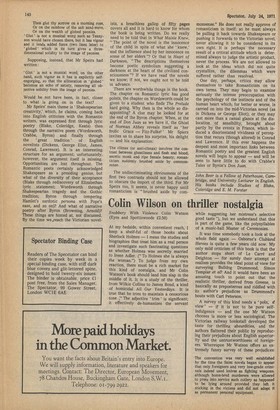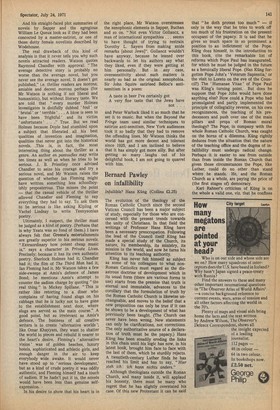Colin Wilson on thriller nostalgia
Snobbery With Violence Colin Watson (Eyre and Spottiswoode £2.50) At my bedside, within convenient reach, I keep a shelf-ful of those books about Sherlock Holmes — I mean the studies and biographies that treat him as a real person and investigate such fascinating questions as whether Holmes was secretly married to Irene Adler. (" To Holmes she is always the woman.") To judge from my own reaction, there must be a rich market for this kind of nostalgia, and Mr Colin Watson's book should land him slap in the middle of it. It is a study of the thriller, from Wilkie Collins to James Bond, a kind of homicidal All Our Yesterdays. It is true that he tries to maintain a censorious tone , " The adjective ' trim ' is significant; it effectively de-humanizes the servant while suggesting her mistress's selective good taste "), but we understand that this is part of the game, like the polysyllables of a music-hall Master of Ceremonies.
It was time somebody took a look at the whole field again — Osborne's Clubland Heroes is quite a few years old now. My only mild criticism of this book is that the author stops short of Le Carre and Deighton — for surely their attempt at realism provides the ideal point of view for surveying Bulldog Drummond, Simon Templar et al? And it would have been an amusing touch to point out that the realistic thriller, derived from Greene, is basically as preposterous and riddled with its author's prejudices as Drummond's bouts with Carl Peterson.
A survey of this kind needs a polit:,if view' — if it is not to be pure selfindulgence — and the one Mr Watson chooses is more or less sociological. The Victorian railway bookstall developed the taste for thrilling absurdities, and the authors flattered their public by reproducing their prejudices about English superiority and the untrustworthiness of foreigners. Whereupon Mr Watson offers an extremely funny survey of these prejudices: The convention was very well established by the time the Saint novels began to appear that only foreigners and very low-grade criminals indeed used knives as fighting weapons, although home-bred murderers were allowed to press into service such cutlery as happened to be lying around provided they left it sticking in the victims and did not adopt it as permanent personal equipment.
And his straight-faced plot summaries of novels by Sapper and the egregious William Le Queux look as if they had been concocted by a master-satirist, or one of those dotty female novelists described by Wodehouse.
The real drawback of this kind of analysis is that it never tells you why such novels attracted readers. Watson quotes Raymond Chandler with approval: "The average detective story is probably no worse than the average novel, but you never see the average novel. It doesn't get published," i.e. thriller readers are morons; amiable and decent morons perhaps (for Mr Watson is nothing if not liberal and humanistic), but without literary taste. We are told that "every murder Holmes investigates is dutifully dubbed ' foul ' or ' brutal ' or ' terrible ' . . . A blow is seen to have been 'frightful ' and its victim ' unfortunate ' . . ." True. But we read Holmes because Doyle had stumbled upon a subject that liberated all his best qualities of invention and imagination, qualities that never got into the historical novels. ,This is, in fact, the most interesting thing about the thriller as a genre. An author en pantoufles may write ten times as well as when he tries to be serious. J. B. Priestley once advised Chandler to seize his courage and try a serious novel, and Mr Watson raises the question of whether Ian Fleming might have written something less schoolboyishly preposterous. This misses the point — that the casual vehicle of the thriller allowed Chandler and Fleming to say everything they had to say. To ask them to be serious is like asking Kipling or Vachel Lindsay to write Tennysonian poetry.
Ultimately, I suspect, the thriller must be judged as a kind of poetry. (Perhaps that is why Yeats was so fond of them.) I have always felt that Greene's entertainments are greatly superior to his serious novels. "Extraordinary how potent cheap music is," says a character in Private Lives. Precisely; because it has its own authentic poetry. Sherlock Holmes had it; Chandler had it; the film of The Third Man had it; Ian Fleming had it. Mr Watson takes a few side-sweeps at Amis's defence of James Bond; he mentions Amis's attempt to counter the sadism charge by quoting "the real thing " in Mickey Spillane. "This is rather like retorting to a diner who complains of having found slugs on his cabbage that he is lucky not to have gone to the establishment next door, where slugs are served as the main course." A good point, but as irrelevant as Amis's defence. The business of all creative writers is to create '.alternative worlds '; like Omar Khayyam, they want to shatter the world to pieces and rebuild it nearer to the heart's desire. Fleming's ' alternative vision' was of golden beaches, luxury hotels, sophisticated and athletic girls, and enough danger in the air to keep everybody wide awake. It would never have stood up to 'serious development,' but as a kind of crude poetry it was oddly authentic, and Fleming himself had a touch of sadism. If he hadn't put it in, the novels would have been less than genuine selfexpression.
In his desire to show that his heart is in
the right place, Mr Watson overstresses the xenophonic elements in Sapper, Buchan and so on. "Not even Victor Gollancz, a man of international sympathies . . . seems to have thought of trying to restrain Dorothy L. Sayers from making snide remarks [about Jews]". Gollancz wouldn't have anyway, because he leaned over backwards to let his authors say what they liked, even if they were getting at him personally. But in any case, oversensitivity about such matters is nearly as bad as the original xenophobia. Sir . John Squire satirised Belloc's antisemitism in a poem:
A taste in beer I've certainly got A very fine taste that the Jews have not . . .
and Peter Warlock liked it so much that he set it to music. But when the Beyond the Fringe team used similar techniques to satirize anti-semitism, New York audiences took it so badly that they had to remove the offending lines. Mr Watson thinks the world has got more decent and tolerant since 1925, and I am inclined to believe that it has simply got more silly. But after getting so many laughs out of his delightful book, I am not going to quarrel with him.











































 Previous page
Previous page